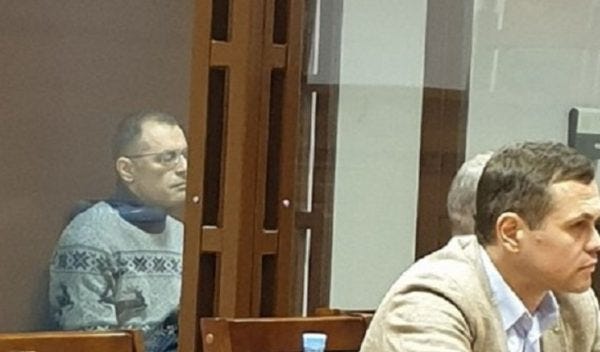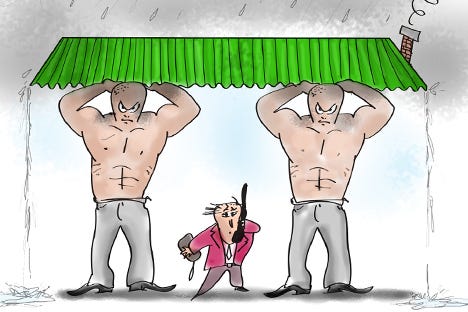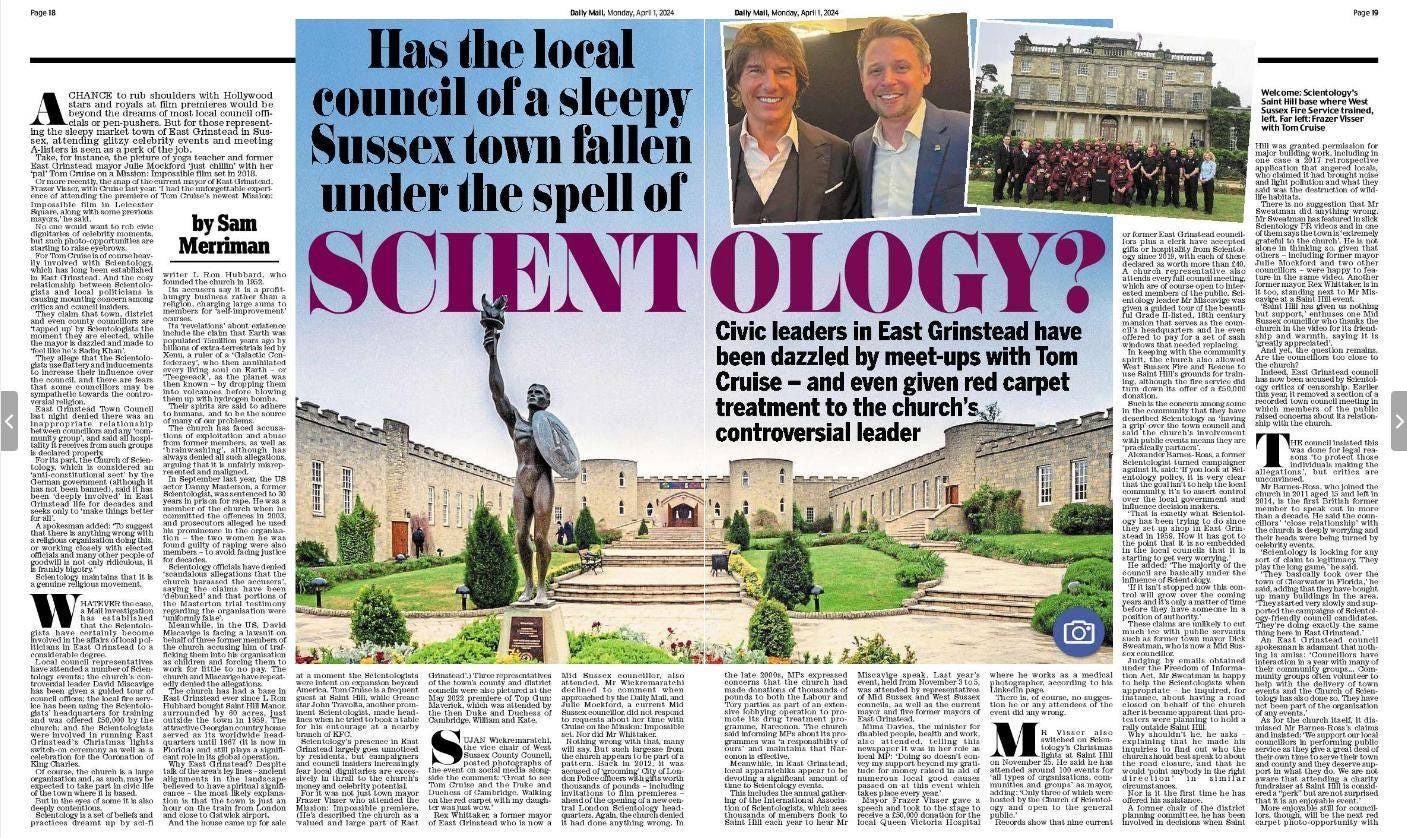[Today’s guest post is by historian Chris Owen]
Since the 1990s, Scientology has faced both boom and bust in post-Soviet Russia, swinging from lucrative success in the “wild capitalism” era of Boris Yeltsin to facing a ruthless crackdown under Vladimir Putin. The writing seemed to be on the wall for Scientology after the Russian police declared Scientology to be an “undesirable” group, raided the Moscow and St. Petersburg orgs, and charged a number of prominent Russian Scientologists with criminal offences. Yet, against the odds, although Scientology is still severely endangered, the war in Ukraine may have given it an unlikely reprieve.
The five St. Petersburg Scientologists charged in 2020 were put on trial on charges of creating an extremist community, inciting interfaith hatred, and carrying out illegal business activities. They were said to have earned more than 276 million rubles (about $3 million at current exchange rates) over several years. The state also sought the confiscation of “3,600 sheets of paper, similar in appearance to 100 US dollar banknotes” (i.e. $360,000 in cash) found at the St. Petersburg org.
To the surprise of observers and, apparently, the prosecution, the case ended anticlimactically in August 2023. All of the defendants were found guilty and the money was confiscated, but the punishments were far less than prosecutors had asked for. The head of the St. Petersburg org, Ivan Matsitsky, was sentenced to 6.5 years in a penal colony but was released as he had already spent an equivalent amount of time in pre-trial detention. The remaining defendants — executive director Galina Shurinova, Office of Special Affairs (OSA) head Anastasia Terentyeva, her deputy Konstantia Esaulkova, and chief accountant Sahib Aliyev – were fined sums of between 600,000 to 1.3 million rubles ($6,500 to $14,000), despite the state asking for up to 30 years’ imprisonment. The court ruled that the statute of limitations had expired and reprieved the defendants from any further punishment.
The outcome of the case was a disappointment for the investigators of Russia’s Federal Security Service (FSB), the country’s domestic security agency (and successor to the KGB), who had carried out the original raid on the St Petersburg org in June 2016. An FSB major who was one of the lead investigators told Evgeny Kolesnikov from the Russian newspaper ‘Versia’ that in his opinion, “the investigation was very weak, formal and lazy. After all, the operational officers provided the investigation with bags full of documents that could have been used to initiate many more criminal cases. For example, incitement to suicide. Several adherents of the Church of Scientology committed suicide because they took out loans for all sorts of training, could not repay them, and were simply squeezed by debt collectors. Terrible things were happening!”
The major expressed incredulity that the statute of limitations had expired and complained that “the investigation chose the most convenient criminal articles lying on the surface” rather than digging deeper. In particular, although the FSB found evidence of the St. Petersburg branch of the Office of Special Affairs carrying out actions against ex-Scientologists, it did not follow it up. According to the major:
“The work of the church security service was not investigated, and it was these people who were scaring the adherents who wanted to leave the sect. It cost a lot of money to leave. Moreover, when we were conducting external surveillance, they managed to establish so-called counter-surveillance, from which we concluded that they had been trained for such work in Western countries. It is not a secret that Scientologists, not their adherents, but those who make money out of naive and unhappy people, receive special training in the United States and England. This includes both specific psycho-training, mastering hypnosis, and purely practical mastering of the work of special services: computer surveillance, outdoor surveillance and counter-surveillance, collecting data on each person, identifying his weaknesses, and all that sort of thing.”
It’s unclear why the investigation appears to have been so half-hearted and the outcome so inconclusive, but the reasons may lie in Russia’s murky and corrupt politics. In 2011, Kolesnikov had experienced the wrath of OSA first-hand when he wrote a critical article on Scientology for the newspaper ‘Arguments and Facts.’ He says that the St Petersburg OSA director, Anastasia Terentyeva, sought to intimidate him into retracting his article: “Various manoeuvres were used in the meeting [with Terentyeva], from carrots to sticks (money for refutation and personal threats).”
Very interestingly, Kolesnikov says that prior to 2016, when the St. Petersburg org was raided, Scientology enjoyed protection from multiple sources. He writes: “I remember the lady’s absolute confidence in her (or rather, the entire organisation’s) impunity. And different “roofs” were mentioned”, presumably by Terentyeva.
The concept of a “roof” (in Russian, a ‘krysha’) is a central organising principle of Putin’s Russia. It’s a principle that emerged from the Russian mafia in the 1990s and has since become central to the entire Russian state. A krysha is essentially protection, provided by powerful individuals or organisations — whether organised criminals or state officials (who may in practice be the same people). An estimated 80 per cent of Russian businesses purchase kryshas to protect themselves from being targeted by criminal gangs or corrupt officials. It is not cheap and can cost anything from 30 to 70 per cent of the purchaser’s profits.
Given the universality of corruption in Russia – which is ranked as one of the most corrupt countries in the world – it is not surprising that Scientology would be involved in buying kryshas. It would be a natural component of Scientology’s ‘safepointing’ procedure which it follows internationally, in which it seeks to obtain protection by recruiting powerful local allies, especially from law enforcement organisations like the LAPD in the US.
The more interesting question is why Scientology’s kryshas did not protect it from being raided in 2016. Kolesnikov writes that he interviewed the same FSB major in 2016 and asked him,” “Why only now, and not earlier?” He answered unexpectedly frankly, but briefly: “Order from the very top.” A krysha can be broken by someone with a superior krysha. In this case, it almost certainly points to the long-serving head of the FSB, Alexander Bortnikov, likely acting to fulfil Putin’s 2012 call for a crackdown on groups such as Scientology.
But why was the investigation apparently botched from the start and the defendants given such light punishments? The outcome of the case suggests that the Russian authorities were never particularly serious about cracking down on Scientology and had carried out the raids for essentially performative reasons – what the Russians call a “mask show” – to keep Putin and the Russian Orthodox Church happy. The legal pressure exerted by the Russian authorities by declaring Scientology an “extremist” group is likely to have been far more significant than the raids.
Since February 2022, Russia has faced far bigger concerns than Scientology. Its invasion of Ukraine has generated an upsurge in patriotism but also widespread opposition to the war. The Russian government has evolved from mildly repressive to overtly totalitarian, jailing thousands of people for long periods – and killing some, like the late Alexey Navalny – for daring to criticise or oppose the regime. The Russian state’s apparatus of repression has switched its focus from maintaining public order to crushing dissent, leading to an upsurge in unpunished murders, rapes and violent crimes. In the face of such challenges, it’s very likely that Scientology has dropped to the bottom of the priority list.
This may offer opportunities for more than just the official Church of Scientology. Since its foundation by the late Captain Bill Robertson in 1984, the independent Scientologists of ‘Ron’s Org’ have operated a small network of ‘Free Zone’ Scientology groups in various European countries. The Swiss-based independents claimed a considerable amount of success in Russia in particular, where they began recruiting in 1997. They claimed to have 2,000 Russian members by 2006 and a dozen orgs in Moscow alone.
It’s likely that the Russian government’s repression of the Church of Scientology has had some effect on the independent Scientologists, but they have nonetheless managed to keep going. Only recently, Max Hauri of Ron’s Org reported having delivered a three-week Class VII course, translated into Russian, to 18 people in Moscow. The independent Scientologists seem to have had a much less troubled time than the official ones. What could account for this difference?
Mostly, of course, this is likely to be because of the problematic behaviour of the Church of Scientology. It has gained particular notoriety in Russia for its members’ involvement in a variety of scams, its secrecy, its US-based hierarchy (always a source of suspicion for Russia) and its aggressive efforts to recruit Russia’s business and political elites. It ran into the opposition of the powerful Russian Orthodox Church — which is practically an extension of the state — and it may have been this factor as well as Putin’s call for a crackdown that prompted the piercing of Scientology’s kryshas in 2016. The independent Scientologists have had much cleaner hands; this likely meant that they did not become an object of attention from the state in the same way as the official church.
It’s not clear why the FSB apparently lost interest in pursuing the investigation, but the most likely explanation is that its priorities — and therefore the allocation of resources — changed between 2016 and 2024. The war in Ukraine may have been a major factor in this. In March 2014, Russia annexed Crimea and launched a covert invasion of eastern Ukraine, seizing control of much of the Donbas region. The FSB now had the task of repressing pro-Ukrainian sentiment among several million de facto or de jure new citizens of Russia. That would have been a far higher priority than anything involving Scientology.
The rapid disposal of the case likely indicates that for the Russian authorities, it had become a nuisance that needed to be gotten out of the way. Ironically, the war in Ukraine may end up benefiting Scientology in Russia in the short term. Since the start of Russia’s full-scale invasion in February 2022, the Russian state has focused on suppressing dissent from opponents of the war (and to some extent from pro-war extreme nationalists as well). Lesser issues such as Scientology and the threat of terrorism have clearly been given a lower priority, with tragic consequences that were visible in the failure to prevent the ISIS attack on Moscow’s Crocus City Hall in March 2024 that killed at least 143 people.
The St. Petersburg Scientologists have regained their freedom, though not their wealth. This, however, does not mean that they are clear of danger. While the baleful attention of the FSB has turned elsewhere for the moment, Russia’s drift into totalitarianism will mean that Scientology’s long-term future in Russia remains in doubt.
— Chris Owen
East Grinstead’s Scientology problem gets the Daily Mail treatment
For months we’ve been covering the mess in East Grinstead, England, where Scientology has its UK headquarters and where, since last November, former London staffer Alex Barnes-Ross has been asking local leaders about their cozy relationship with the church.
Today, the Daily Mail has a lengthy piece reviewing the chummy dealings between David Miscavige’s crew and various members of the town and district councils.
Alex continues to get major press for the questions he’s raising about Scientology in the UK, and we can’t wait to see what he comes up with next.
Want to help?
Please consider joining the Underground Bunker as a paid subscriber. Your $7 a month will go a long way to helping this news project stay independent, and you’ll get access to our special material for subscribers. Or, you can support the Underground Bunker with a Paypal contribution to bunkerfund@tonyortega.org, an account administered by the Bunker’s attorney, Scott Pilutik. And by request, this is our Venmo link, and for Zelle, please use (tonyo94 AT gmail). E-mail tips to tonyo94@gmail.com.
Thank you for reading today’s story here at Substack. For the full picture of what’s happening today in the world of Scientology, please join the conversation at tonyortega.org, where we’ve been reporting daily on David Miscavige’s cabal since 2012. There you’ll find additional stories, and our popular regular daily features:
Source Code: Actual things founder L. Ron Hubbard said on this date in history
Avast, Ye Mateys: Snapshots from Scientology’s years at sea
Overheard in the Freezone: Indie Hubbardism, one thought at a time
Past is Prologue: From this week in history at alt.religion.scientology
Random Howdy: Your daily dose of the Captain
Here’s the link to today’s post at tonyortega.org
And whatever you do, subscribe to this Substack so you get our breaking stories and daily features right to your email inbox every morning.
Paid subscribers get access to two special podcast series…
Up the Bridge: A journey through Scientology’s actual “technology”
Group Therapy: Our round table of rowdy regulars on the week’s news






Lovely work, those mayors of East Grinstead! Now, everyone who opens a Daily Fail (or indeed anyone who surfs to what is apparently on of the Internet's biggest news sites) will know that at least some mayors get to enjoy the company of completely random $cientology mouthpieces.
Slow clap.
And keep at it, Apostate Alex, East Grinstead has a long way to go.
Excellent explanation.
So, until the future when things of concern to the Russian State dies down, and when the cyclical "crim regging" raises it's head again, as this Scientology/Hubbard greed always raises it's head, as new generations of new budding "crim regges" and new Scientology management demand MORE income, when "Hard Sell" comes back into fashion for official Scientology.
It's been an historical pattern, ever since the Hubbard "Hard Sell" references were put into a whole "Hatting Pack" for study, over and over, over the decades. Scientology busts it's "Crim Regges" and then they fade away for a time, then the "income demand" raises up again, new management.
And like Chris points out in this excellent article, the splinter Scientology in Russia does not engage as greedily as does official Scientology.
Like the ever shifting sands, or tides, the Hubbard dogma negative writings spur new generations of official/"orthodox" Sea Org managed Scientology groups. "Lost tech" even was a Hubbard label put on old Hubbard regulations and writings, dusted off, and reused, all to official Scientology's detriment, rather than being helpful.
The history of why the non greedy Russian freezone Scientology splinter group even formed, would be a lesson to official Scientology. But, sadly, the splinter Scientology then runs into the Hubbard dogma about "squirrel" groups which also to Hubbard, don't pay to "management" in the US, fees like do all the "in good standing" sub units of official/"orthodox" Scientology.
Hubbard's fault, always, literally always.
Thankyou Chris Owen for understanding so much.
- Chuck Beatty
ex Sea Org paperpusher and on projects to do with Hubbard's admin regulations 1975 to 2003
PS: Literally I began reading Chris Owen's work in the early months of 2003 when I was still on the RPF's RPF at a branch of the LA Public Library! "This is True" (literally) Eternal thanks CHRIS OWEN!